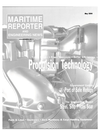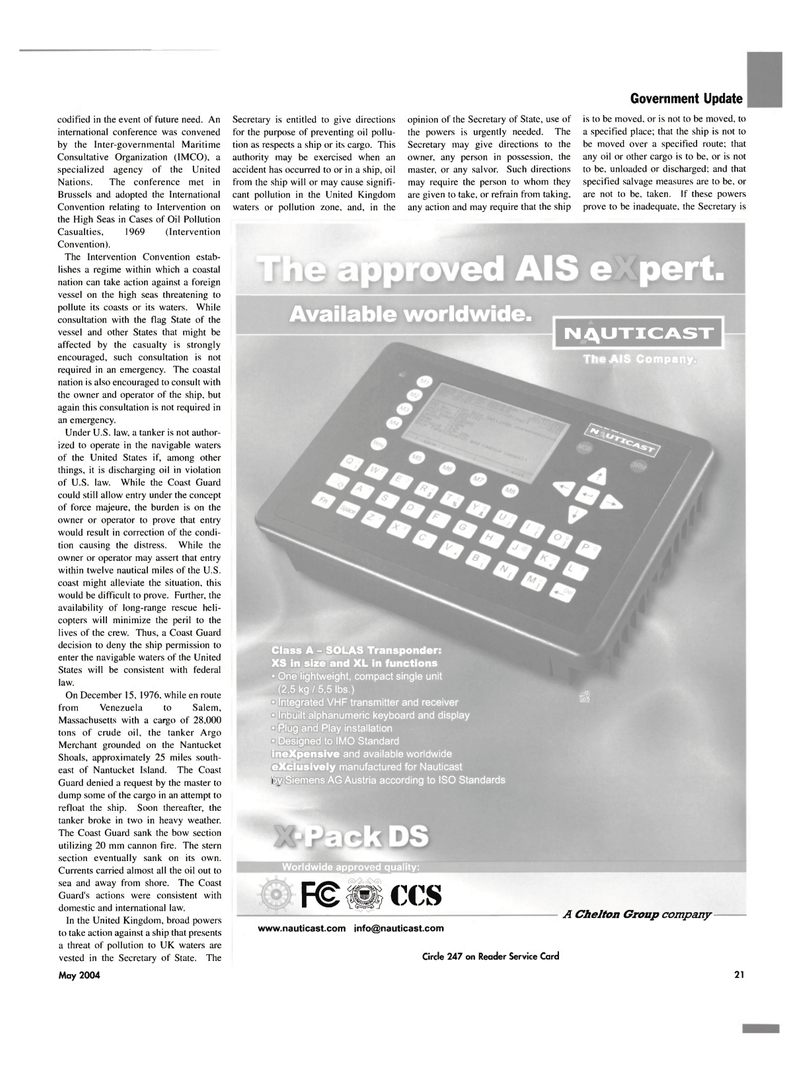
Page 23: of Maritime Reporter Magazine (May 2004)
The Propulsion Technology Yearbook
Read this page in Pdf, Flash or Html5 edition of May 2004 Maritime Reporter Magazine
Government Update codified in the event of future need. An international conference was convened by the Inter-governmental Maritime
Consultative Organization (IMCO), a specialized agency of the United
Nations. The conference met in
Brussels and adopted the International
Convention relating to Intervention on the High Seas in Cases of Oil Pollution
Casualties, 1969 (Intervention
Convention).
The Intervention Convention estab- lishes a regime within which a coastal nation can take action against a foreign vessel on the high seas threatening to pollute its coasts or its waters. While consultation with the flag State of the vessel and other States that might be affected by the casualty is strongly encouraged, such consultation is not required in an emergency. The coastal nation is also encouraged to consult with the owner and operator of the ship, but again this consultation is not required in an emergency.
Under U.S. law, a tanker is not author- ized to operate in the navigable waters of the United States if, among other things, it is discharging oil in violation of U.S. law. While the Coast Guard could still allow entry under the concept of force majeure, the burden is on the owner or operator to prove that entry would result in correction of the condi- tion causing the distress. While the owner or operator may assert that entry within twelve nautical miles of the U.S. coast might alleviate the situation, this would be difficult to prove. Further, the availability of long-range rescue heli- copters will minimize the peril to the lives of the crew. Thus, a Coast Guard decision to deny the ship permission to enter the navigable waters of the United
States will be consistent with federal law.
On December 15, 1976, while en route from Venezuela to Salem,
Massachusetts with a cargo of 28,000 tons of crude oil, the tanker Argo
Merchant grounded on the Nantucket
Shoals, approximately 25 miles south- east of Nantucket Island. The Coast
Guard denied a request by the master to dump some of the cargo in an attempt to refloat the ship. Soon thereafter, the tanker broke in two in heavy weather.
The Coast Guard sank the bow section utilizing 20 mm cannon fire. The stern section eventually sank on its own.
Currents carried almost all the oil out to sea and away from shore. The Coast
Guard's actions were consistent with domestic and international law.
In the United Kingdom, broad powers to take action against a ship that presents a threat of pollution to UK waters are vested in the Secretary of State. The
May 2004
Secretary is entitled to give directions for the purpose of preventing oil pollu- tion as respects a ship or its cargo. This authority may be exercised when an accident has occurred to or in a ship, oil from the ship will or may cause signifi- cant pollution in the United Kingdom waters or pollution zone, and, in the opinion of the Secretary of State, use of the powers is urgently needed. The
Secretary may give directions to the owner, any person in possession, the master, or any salvor. Such directions may require the person to whom they are given to take, or refrain from taking, any action and may require that the ship is to be moved, or is not to be moved, to a specified place; that the ship is not to be moved over a specified route; that any oil or other cargo is to be, or is not to be, unloaded or discharged; and that specified salvage measures are to be, or are not to be, taken. If these powers prove to be inadequate, the Secretary is ed AIS e pert.
Available worldwide.
NftUTICAST
The AIS Company. /\f
Class A - SOLAS Transponder:
XS in size and XL in functions • One lightweight, compact single unit (2,5 kg/5,5 lbs.) • Integrated VHF transmitter and receiver • Inbuilt alphanumeric keyboard and display • Plug and Play installation • Designed to IMO Standard inexpensive and available worldwide exclusively manufactured for Nauticast by Siemens AG Austria according to ISO Standards
Worldwide approved quality:
F€ m ccs j'
A Che J ton Group company- [email protected]
Circle 247 on Reader Service Card 21

 22
22

 24
24
